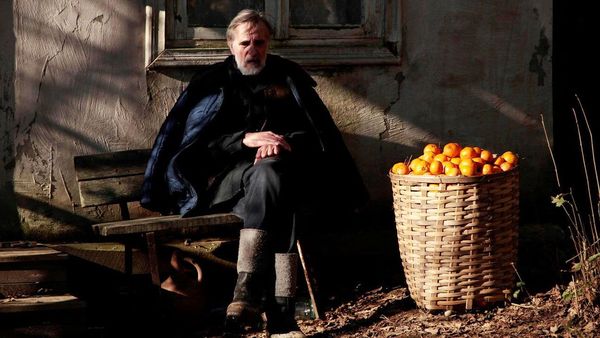Eye For Film >> Movies >> Tangerines (2013) Film Review
Tangerines
Reviewed by: Amber Wilkinson

The first Estonian film (it is a Georgian co-production) to make the foreign language Oscar shortlist since the country started entering films in 1992, Zaza Urushadze's humanistic and moving examination of how innocents can be caught up in war - and how choosing sides can be absurd - is fully deserving of the recognition.
It focuses on a corner of of the Caucasus, a place that had been home to Estonian settlements for a century, but where the populace was mostly forced to flee in 1992, when war broke out between Georgia and Russian-backed Abkhazia. The setting could barely look less like the sort of frontline we usually see on movie screens, with its lush green trees, rich browns and tiny settlements, but then, as one character points out, "Cinema is a big fraud".

It is against this bucolic backdrop that elderly Ivo (Lembit Ulfsak with a wonderfully lived-in performance) resides. The rest of his family are only glimpsed in photographs in the rustic home he occupies alone, while his days are spent in the haze of sawdust, constructing crates to help his friend Margus (Elmo Nüganen) who is determined to collect one last tangerine harvest before he follows the rest of his family and neighbours back to Estonia.
They may not want any part of it but the war comes to their doorstep when a skirmish breaks out on the neighbouring road. The Estonians find an injured Chechen mercenary (Giorgi Nakashidze) and take him into Ivo's house. When they go to bury the dead, they discover that one of the Georgians (Mikheil Meskhi) is also still alive, though gravely injured. Taking him back to Ivo's house and putting him in a second room, the stage is set for an examination of conflict in microcosm as the two men gradually get well, while Ivo remains stoically neutral, refusing to allow bloodshed under his own roof.
The title doesn't just refer to the fruit grown by Margus, it also references the film's main colour contrast - captured beautifully by Rein Kotov's cinematography - whether it is the tangerines, shiny against the deep leafy green, the flicker of candlelight as Ivo tends his patients or the sharp orange glow of headlights or a fire in the night.
There is something of the tragicomic humour of Samuel Beckett about the men's predicament, particularly in the way that Margus and Ivo are waiting for there own sort of Godot - soldiers promised by a local major to help them pick the fruit. Equally, the absurdity of two injured men desperate to kill one another is quickly established, although Urushadze also finds plenty of pathos and poignancy in the situation, as his film shows that the shifting opinion of one or two individuals is not enough to turn the tide of a war. Accompanied by a melancholy but atmopsheric refrain from Niaz Diasamidz, which gives an excellent sense of place as well as adding to the elegiac mood, the film is a great example of how powerful and universal small but well-crafted stories can be.
Reviewed on: 17 Feb 2015















